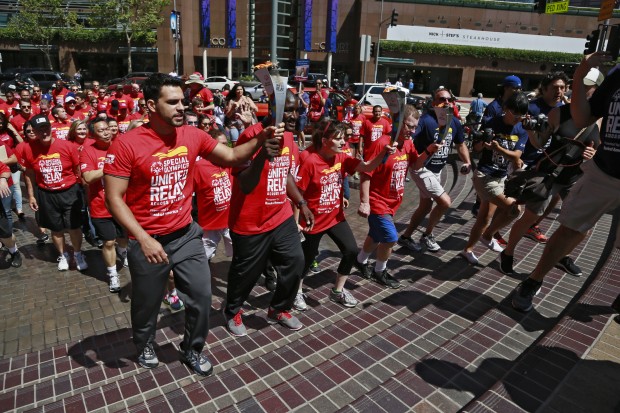
In this Friday, July 10, 2015, photo, torch-bearing runners arrive in South Hope Street Plaza to light the Special Olympics cauldron downtown Los Angeles. First lady Michelle Obama will open the Special Olympics World Games on Saturday, July 25, at the Los Angeles Memorial Coliseum, site of both the 1932 and 1984 Summer Olympics. (AP Photo/Nick Ut)
LOS ANGELES — The first Special Olympics World Games drew about a thousand U.S. and Canadian competitors to Chicago for an event designed to celebrate athletes with intellectual disabilities.
“It was probably a little on the small side,” Olympic icon Rafer Johnson, who welcomed those competitors in 1968, recalled recently with a chuckle, “but it had an unbelievable amount of enthusiasm.”
Nearly a half-century later, the games will bring some 6,500 athletes from 165 countries to Los Angeles this week to take part in 25 sports at venues across the city. And Johnson, who won a gold medal in the decathlon at the 1960 Olympics, will be there to welcome them again.
Athletes ages 8 to 71 will compete in soccer, basketball, volleyball, tennis, track, roller skating and other sports over nine days. About a half-million people are expected to come watch, including Olympic gold medalists swimmer Michael Phelps and diver Greg Louganis, Chinese basketball great Yao Ming and even first lady Michelle Obama, who will open the event Saturday at the Los Angeles Memorial Coliseum, site of the 1932 and 1984 Summer Olympics.
“It’s going to be the largest event Los Angeles has hosted since the 1984 Summer Olympics, and the largest sports-humanitarian event in the world this year,” said Patrick McClenahan, president and chief executive of LA2015, the nonprofit bringing the games to LA.
Musicians Stevie Wonder, Avril Lavigne and others will perform at the opening ceremonies. The event is similar to the Olympics that inspired it, but with a few tweaks.
Athletes will be placed in divisions based on age and skill level so, for example, a 10-year-old sprinter doesn’t wind up running against a 25-year-old. While the top three finishers will receive gold, silver and bronze medals, everyone will receive a participant’s ribbon and a chance to stand on the victory platform.
The games were created by President John F. Kennedy’s sister Eunice Kennedy Shriver as a way of allowing people with intellectual disabilities to enjoy fuller lives. After years of holding a smaller version in her backyard, she took them international in 1968.
From that humble beginning, they have become much more, says Dustin Plunkett, a LA2015 board member.
“It’s about life-saving experiences for people. It’s about learning to be the best person you can be,” says Plunkett, a former Special Olympics athlete.
“When I was a kid, I was moving pretty much home to home, family member to family member, and nobody in my family knew how to support me because of my cleft palate and my intellectual disability,” he said in a recent interview.
Plunkett, who has a cognitive disability, recalls growing up bored and being called names until he started playing sports.
A coach got him into a Southern California Special Olympics program, and over the next 19 years, Plunkett, now 34, went from athlete to coach to Special Olympics global ambassador. This year, he designed the uniforms for 30,000 volunteers and will provide color commentary for ESPN, a cable TV sports channel.
He’s the perfect example of what the Special Olympics, with its credo of being the best one can be, allows a person to accomplish, says McClenahan, the LA2015 chief.
Indeed, it’s people like Plunkett, Johnson says, that keep him coming back to the Special Olympics.
Johnson, who will turn 80 next month, carried the American flag into the 1960 opening ceremonies in Rome as captain of the U.S. Olympic team and lit the flame to open the 1984 Olympics.
Those were great moments, he says, but he still gets choked up when he talks about seeing an opening ceremony for the Special Olympics World Games and the joy it brings to those who participate.
“Man, it just seems like the words aren’t really enough to pull out what it really means,” he said. “Needless to say, they are moments that I literally will never forget. And I’m looking forward to adding these local ceremonies to that group of memories.”

